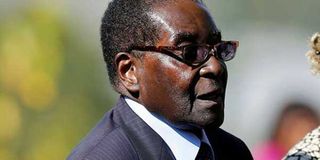Nostalgia and when to be on first name terms

Former President of Zimbabwe Robert Mugabe. Mr Mugabe once specifically pleaded with a group of us — in the newspaper in Dar es Salaam— to address him as “Comrade Bob”, even simply as “Bob”. PHOTO | SIPHIWE SIBEKO | AFP
What you need to know:
Though, in Dar es Salaam, I was on first-name terms with “Bob” (Mugabe), today both Mr Kenyatta and Mr Museveni would have to expressly allow me to call them Uhuru and Yoweri, respectively.
Indeed, even if they did, I would still need special courage to get those names out of my mouth near them.
Whether or not you agree with your national leaders, you must address them with the respect due to them.
The word nostalgia refers to a longing for someone, something, some practice or some idea that one used to be fond of but which has subsequently been thrown into the waste paper basket of time and place.
That, apparently, was the meaning intended by the Nairobi Nation’s headline writer who wrote as follows the other day: “Alas, Mugabe nostalgia in Zimbabwe”.
ATTITUDE
In that context, the word alas made it quite clear that Mr Mugabe is not a darling of that headline writer and of all those who allowed that headline to pass muster. The headline’s writer was expressing his or her own negative attitude towards the politician. Yet the headline might also have been expressing the whole Nation company’s attitude to Mr Mugabe.
That, however, is something I cannot know for certain. For I left the Nation Media Group’s establishment very many years ago. Nevertheless, I have usually joined the Eastern and Southern African nationals in their intense collective dislike for Mr Mugabe.
But so what? I ask for the very simple reason that, where public manners are concerned, a personal attitude to any politician is difficult to express in a personal column.
COMRADE BOB
In practical terms, my opinion of any political leader anywhere in the world remains my own. My opinion remains irrelevant in public terms. Among the simple reasons I would not today publicly refer to the Zimbabwean leader by his first name “Robert” is that I am not qualified to vote in that southern African country.
Although when he was in exile in the Tanzanian capital of Dar es Salaam a few decades back — namely, at the same time as I worked there as a newspaper sub-editor, columnist and analyst — Mr Mugabe once specifically pleaded with a group of us — in the newspaper — to address him as “Comrade Bob”, even simply as “Bob”.
Unfortunately, Mr Mugabe has never impressed me positively. That is one of a million reasons that I would find it extremely difficult to call Uhuru Kenyatta, the Kenyan leader, simply as “Uhuru” and the Ugandan leader simply as Yoweri Museveni (though, intellectually, I have known Mr Museveni much more closely than I have ever known Mr Kenyatta).
CONSCIOUS
Though, in Dar es Salaam, I was on first-name terms with “Bob” (Mugabe), today both Mr Kenyatta and Mr Museveni would have to expressly allow me to call them Uhuru and Yoweri, respectively. Indeed, even if they did, I would still need special courage to get those names out of my mouth near them. Whether or not you agree with your national leaders, you must address them with the respect due to them.
As head of The Daily News, Benjamin Mkapa was the only newspaper editor whom I have ever worked under who subsequently became a country’s national president. Benjamin was also the most highly educated in academic terms and, socially speaking, the most conscious — though he was never as radical as Africa’s Western observers thought all of Julius Nyerere assistants to be.
The writer is a veteran journalist.





